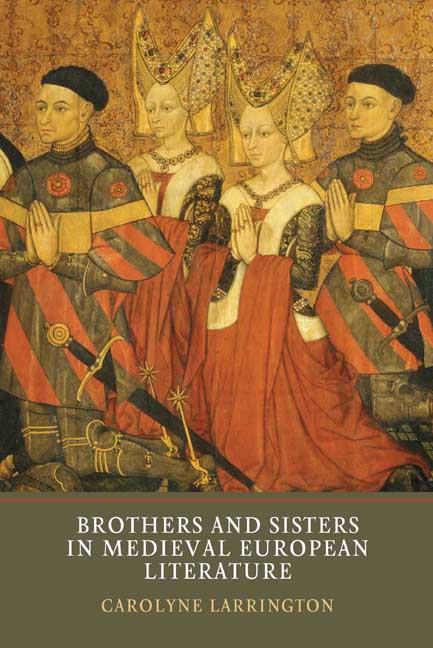Book contents
- Frontmatter
- Dedication
- Contents
- Acknowledgements
- Abbreviations
- Introduction
- 1 The Medieval Sibling in History
- 2 ‘Berr er hverr á bakinu nema sér bróður eigi’: Fraternal Love and Loyalty
- 3 ‘Io v’ho cara quanto sorella si dee avere’: Sisters, and their Brothers
- 4 ‘Næs þæt andæges nið’: Fraternal Hatreds
- 5 ‘Te souviegne de ce que je suis ta seur’: Sisters and Hostility
- 6 ‘The king’s dochter gaes wi child to her brither’: Sibling Incest
- 7 ‘So wil ich dir ce wibe mine swester gebn’: When Siblings Marry
- 8 ‘Trewethes togider that gun plight’: Fictive Siblings
- Conclusion
- Bibliography
- Index
7 - ‘So wil ich dir ce wibe mine swester gebn’: When Siblings Marry
Published online by Cambridge University Press: 08 May 2021
- Frontmatter
- Dedication
- Contents
- Acknowledgements
- Abbreviations
- Introduction
- 1 The Medieval Sibling in History
- 2 ‘Berr er hverr á bakinu nema sér bróður eigi’: Fraternal Love and Loyalty
- 3 ‘Io v’ho cara quanto sorella si dee avere’: Sisters, and their Brothers
- 4 ‘Næs þæt andæges nið’: Fraternal Hatreds
- 5 ‘Te souviegne de ce que je suis ta seur’: Sisters and Hostility
- 6 ‘The king’s dochter gaes wi child to her brither’: Sibling Incest
- 7 ‘So wil ich dir ce wibe mine swester gebn’: When Siblings Marry
- 8 ‘Trewethes togider that gun plight’: Fictive Siblings
- Conclusion
- Bibliography
- Index
Summary
Introduction
Sibling closeness fluctuates at different stages of life. A brother's or sister's marriage entails a radical redefinition of relationships, both for the one who weds and for the other siblings. Affines (relations by marriage) very often belong to the same age-cohort as the new spouses’ siblings, and thus they may feel themselves to be in competition, with same-sex in-laws in particular. Francine Klagsbrun suggests:
What is re-awakened when a sib-in-law appears on the scene is the very old perception of being dethroned, as they had once been when a new-born sibling entered their lives back in childhood. And what they lose, as they lost then, is the exuberance of being in charge, in control, at the center.
Juliet Mitchell's psychoanalytic investigations predict that sibling bonds formed in childhood will condition later marital and affinal relationships, and thus fierce rivalry and inappropriate sexual feelings as well as warm loyalty and generosity can mark affinal ties, just as they colour sibling interactions. Anthropologists attend closely to in-laws, although the earlier fundamental assumption that the subject is male has tended to exclude or underestimate the female subject in in kin and family analyses and in the ‘exchange of women’. Feminist anthropologists have now redressed this imbalance, increasingly focus on female perspective and agency in narratives told about affinal relationships.
‘[M]arriages are not always so simply activities to make peace’, observes Gayle Rubin, ‘Marriages may be highly competitive, and there are plenty of affines who fight each other.’ In the medieval literary imagination, the affinal relationship productive of the most dramatic narratives is that between a woman's brother(s) and her husband: an alliance previously perceived by the bride's family as advantageous can suddenly turn sour. For, as argued earlier, successful fraternal relationships are predicated on managing difference; yet considerations of status mean that a sister is likely to gain a husband who belongs to the same social stratum as her brother. Brothers-in-law are expected to form mutual homosocial bonds, sealed by the ‘exchange of women’; their reciprocal relationship is guaranteed by a woman who is a legitimate object of desire for one participant, and tabooed for the other.
- Type
- Chapter
- Information
- Brothers and Sisters in Medieval European Literature , pp. 181 - 207Publisher: Boydell & BrewerPrint publication year: 2015



